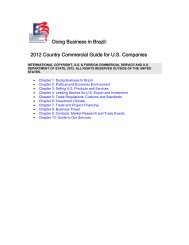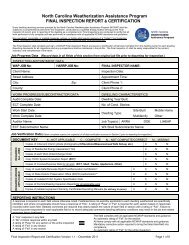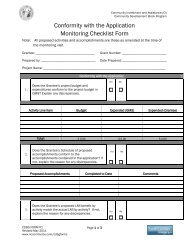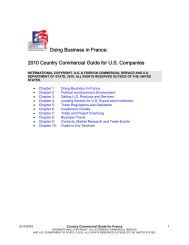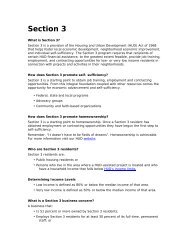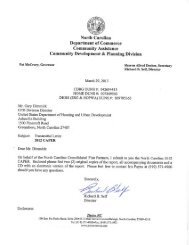Agricultural SectorsReturn to topOverviewReturn to topUnder NAFTA, Mexico has become one <strong>of</strong> the largest and fastest growing markets forU.S. agricultural products and one <strong>of</strong> the best opportunities in the world for U.S.exporters <strong>of</strong> food products. However, Mexico’s economic performance fell significantlyin 2009, due in part because <strong>of</strong> Mexico’s dependence on the U.S. economy as well asthe initial effects <strong>of</strong> the global financial crisis. On average, real GDP growth for 2009decreased by an estimated -8.0 percent, compared to the modest 1.4 percent growthrate recorded in 2008. Experts predict that Mexico’s GDP will rebound by approximately2.8 percent in 2009. Likewise, the Mexican peso has already lost approximately 25percent <strong>of</strong> its value relative to the dollar over the past year and uncertainty remainsabout the peso’s future stability. Since the end <strong>of</strong> October 2008, the peso fell from 10pesos to 13.50 pesos per U.S. dollar despite the Central Bank <strong>of</strong> Mexico’s interventions.The Mexican peso remains around 13 pesos per dollar and many experts expect thepeso to hover near this exchange rate for the near future. While foreign currencyremittances will benefit some families due to this depreciating exchange rate, overallremittances from the United States and Europe were 20 percent lower in 2009 than in2008 and are expected to remain down as migrant labor returns to Mexico. ForeignDirect <strong>In</strong>vestment (FDI) reached $18.8 billion in 2008, but FDI that Mexico had receivedbetween January and September 2009 summed $9.75 billion dollars, a decline <strong>of</strong> 37%over the same period last year.Overall demand for U.S. agricultural products is expected to remain relatively stable in2010 until there is an upturn in the Mexican economy. Mexican consumers have lessmoney to spend, due to the economic slowdown and decline in foreign remittances fromMexican workers in the United States and Spain. The Mexican agricultural sectoraccounts for approximately 3.8 percent <strong>of</strong> GDP.Despite the exchange rate effect, overall market share is not likely to be affected, as thegeographic and tariff advantages that the U.S. enjoys in Mexico are likely to continue tomake the U.S., by far, the best import option for most major agricultural goods. Theproducts most likely to be affected are high-value agricultural products, such as redmeats and some processed products. The only products likely to sufferdisproportionately are those affected by Mexico's imposition <strong>of</strong> punitive tariffs due to theU.S. Government's suspension <strong>of</strong> the U.S.-Mexico Cross-Border TruckingDemonstration Project.While it is too early to predict the value <strong>of</strong> agricultural trade in Calendar Year (CY) 2010,trade is most likely to remain relatively stable, although growth will be less than theaverage annual growth rates in agricultural trade seen under NAFTA, <strong>of</strong> 9 percent peryear, and well below the 25 percent growth seen in Fiscal Year (FY) 2008. Agriculturaltrade is not expected to increase until a recovery is posted, which is not predicted untilthe end <strong>of</strong> the first quarter <strong>of</strong> 2010 or later.Total U.S. agricultural, fishery, and forestry exports for CY 2008 reached $16.6 billion,an increase <strong>of</strong> 25 percent over the previous year’s level exports. However, due to theeconomic and financial crisis which began in late 2008, U.S. exports to Mexico in 2009are down 22.3 percent (January through October comparison) compared to 2008.
The United States’ major agricultural exports to Mexico from January to October 2009were ($US Billion): red meat ($1.3), coarse grains ($1.5), soybeans and meal ($1.5),poultry meat ($0.47), dairy products ($0.53), fresh fruits and vegetables ($0.39), wheat($0.4), cotton ($0.3)m, and feeds and fodder ($.3).The following tables summarize the market situation <strong>of</strong> commonly exported U.S.agricultural products:1.- Dairy Products (1000 Metric Tons)2007 2008 2009Total Market Size 1/ 11,854 12,039 12,285Total Local Production 11,480 11,686 11,940Total Exports 8 17 15Total Imports 374 353 345Imports from the U.S. 2/ 316 327 3001/ PSD Post Statistics, Foreign Agricultural Service2/ World Trade AtlasNon-fat dry milk (NFDM) exports from the U.S. to Mexico increased a moderate 4percent in 2009. The large increase <strong>of</strong> U.S. exports to Mexico witnessed in 2008 was adirect result <strong>of</strong> NAFTA being fully implemented. Many factors continue to weigh on theMexican dairy sector such as the financial crisis and the presence <strong>of</strong> noncompetitivedairy producers. Given the current poor economic situation and the politicalenvironment, LICONSA, a state-run dairy enterprise, will continue to increase purchases<strong>of</strong> domestically produced milk and reduce its imports <strong>of</strong> non-fat dry milk (NFDM).However, since dairy products are basic ingredients in the Mexican diet, Mexico’s fluidmilk production is expected to continue to grow, leading to increased production <strong>of</strong>cheese, butter, powdered milk, and other dairy products.2.- Red Meat (1000 Metric Tons)1/ PSD Post Statistics, Foreign Agricultural Service2007 2008 2009Total Market Size 1/ 3,641 3,704 3,677Total Local Production 2,787 2,761 2,777Total Exports 122 133 131Total Imports 854 943 900Imports from the U.S. 2/ 525 605 6312/ World Trade AtlasDue to the international economic crisis, weak demand, a volatile exchange rate andlower gross family incomes, the rate <strong>of</strong> growth for red meat consumption in Mexico isexpected to decline. Many middle and lower income consumers are expected to switchaway from red meats to cheaper protein sources. U.S. beef exports to Mexico weredown 83 percent in 2009. Live calf and red meat exports are forecast to increase in themedium term. 2009 was a difficult year for pork in Mexico due to the H1N1 outbreak.Early on during the outbreak, the Mexican press consistently used the term “swine flu,”which increased fears and resulted in lower consumption and domestic production.However, lower prices, an effective media consumption campaign, and increased
- Page 1: Doing Business in Mexico: 2010 Coun
- Page 4 and 5: Return to table of contentsChapter
- Page 6 and 7: Before signing an agent/distributor
- Page 8 and 9: In order to satisfy clients’ dema
- Page 10 and 11: egardless of their geographic proxi
- Page 12 and 13: The following companies organize tr
- Page 14 and 15: to create a solid contract that inc
- Page 17 and 18: Web ResourcesReturn to topU.S. Gove
- Page 19 and 20: AgribusinessOverviewReturn to top20
- Page 21 and 22: Automotive Parts and SuppliesOvervi
- Page 23 and 24: ResourcesState of Jalisco Auto-part
- Page 25 and 26: • Corporate training programs in
- Page 27 and 28: excluding large hydroelectric proje
- Page 29 and 30: Environmental SectorOverviewReturn
- Page 31 and 32: Franchising SectorOverviewReturn to
- Page 33 and 34: Hotel and Restaurant EquipmentOverv
- Page 35 and 36: Housing and Construction ServicesOv
- Page 37 and 38: Internet and IT ServicesOverviewRet
- Page 39 and 40: Packaging EquipmentOverviewReturn t
- Page 41 and 42: With this boom in the packaging sec
- Page 43 and 44: • Integrated security solution(co
- Page 45 and 46: CATV: Today 30% of homes have pay-T
- Page 47 and 48: and expanding facilities and servic
- Page 49: destinations are typically not popu
- Page 53 and 54: 5.- Fresh Fruit (apples, pears, gra
- Page 55 and 56: ResourcesReturn to topThe USDA’s
- Page 57 and 58: order region and 16 percent for pro
- Page 59 and 60: U.S. Export ControlsReturn to topMe
- Page 61 and 62: and organs, almost all medical prod
- Page 63 and 64: Organizations that develop NMX - Me
- Page 65 and 66: Certification Bodies:EMA has accred
- Page 67 and 68: The LFMN and its Regulation establi
- Page 69 and 70: NOM-137-SSA1-2008 Regulatory inform
- Page 71 and 72: Mexico is the country with the larg
- Page 73 and 74: Return to table of contentsChapter
- Page 75 and 76: SECTION 2: SECTORS RESERVED FOR MEX
- Page 77 and 78: majority share (about 75 percent) o
- Page 79 and 80: Expropriation and CompensationRetur
- Page 81 and 82: contribution. The Mexican Bank for
- Page 83 and 84: Government continues to work with i
- Page 85 and 86: to banks and non-bank banks. Despit
- Page 87 and 88: government sent the sent the Federa
- Page 89 and 90: Business Transactions (OECD Antibri
- Page 91 and 92: • Information about the OECD Anti
- Page 93 and 94: Greece, Italy, Netherlands, Portuga
- Page 95 and 96: Foreign Direct Investment Realized
- Page 97 and 98: Return to table of contentsChapter
- Page 99 and 100: individuals who are equally new to
- Page 101 and 102:
sector, which is expected to uncove
- Page 103 and 104:
Return to table of contentsChapter
- Page 105 and 106:
For further information please visi
- Page 107 and 108:
Local Time, Business Hours, and Hol
- Page 109 and 110:
Mr. Garth ThorburnDirector, U.S. Ag
- Page 111 and 112:
Asociación Nacional de Importadore




